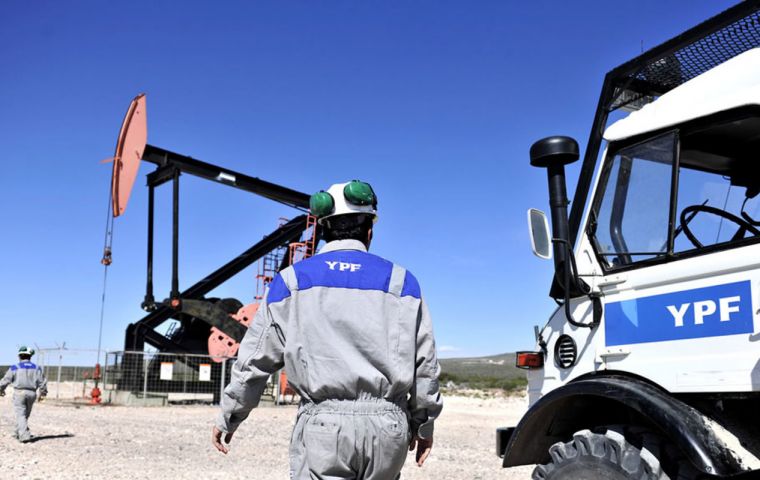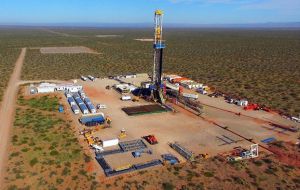MercoPress. South Atlantic News Agency
COVID-19 could crush Argentina’s shale boom
 Argentina, across multiple administrations, subsidized unconventional oil and gas, until it became unaffordable and subsidies were scaled back
Argentina, across multiple administrations, subsidized unconventional oil and gas, until it became unaffordable and subsidies were scaled back  Vaca Muerta struggles to work even with Brent crude at US$ 50 per barrel. But at US$ 30 or US$ 40, investment could really begin to dry up.
Vaca Muerta struggles to work even with Brent crude at US$ 50 per barrel. But at US$ 30 or US$ 40, investment could really begin to dry up.  Francisco Monaldi, Fellow at the Baker Institute of Rice University, said in early June, “Today, there are no rigs operating in the country. A catastrophe.”
Francisco Monaldi, Fellow at the Baker Institute of Rice University, said in early June, “Today, there are no rigs operating in the country. A catastrophe.” By Nick Cunningham of Oilprice.com – Holding some of the largest shale oil and gas reserves in the world, Argentina is often cited as the likely candidate for the next big shale boom, and Vaca Muerta is often described as having the potential to be South America’s Permian basin.
But already wounded, the global coronavirus pandemic and the ensuing oil market meltdown could lead the “Dead Cow to slaughter,” according to a new report.
On its own, Vaca Muerta has consistently disappointed. For years, production inched up slowly, undershooting expectations. Partially state-owned YPF is the principle driver of drilling activity in the Vaca Muerta, but the company does not have the resources to really scale the basin up on its own. Thus, the recent history of the Vaca Muerta can be characterized by joint ventures between YPF and international oil companies, particularly Chevron, ExxonMobil, Total, BP and Royal Dutch Shell.
But the oil majors have not invested serious money in the way that the Argentine government had hoped. Relative to what they do elsewhere around the world, the majors have hesitated in Argentina, due to a long list of challenges.
The Argentine government, across multiple administrations, subsidized unconventional oil and gas. That is, until it became unaffordable, at which point subsidies were scaled back. Debt, currency volatility, inflation and other macroeconomic problems also confounded the operational goals of the oil majors.
That was all true before the pandemic and the oil market meltdown. Vaca Muerta struggles to work even with Brent crude at US$ 50 per barrel. But at US$ 30 or US$ 40, investment could really begin to dry up.
As the global oil market began to fall apart earlier this year, fracking activity in Argentina’s Vaca Muerta came to a complete halt, with the number of fracking stages (a common measure of drilling activity in Argentina) falling from 430 in March to zero in April.
“In 2015, there we about 100 oil rigs operating in Argentina, and by the first half of 2019, there were still around 60 rigs, mostly in Vaca Muerta,” Francisco Monaldi, Fellow in Latin America Energy Policy at the Baker Institute of Rice University, said in an interview with the Wilson Center in early June. “Today, there are no rigs operating in the country. A catastrophe.”
A nationwide lockdown and the collapse of global crude oil prices not only forced drilling to cease, but also forced refiners to cut back on processing and existing upstream production to shut in. In April, YPF and Chevron slashed production by half at the Loma Campana oil field, the most important unconventional operation in all of the Vaca Muerta and arguably in all of South America.
Already struggling, the bust in the Permian is also undercutting the hype of Vaca Muerta. If capital is flowing out of the Permian – the most attractive shale basin on the planet – then it hardly makes sense to pump money into the ground in Northern Patagonia. The pandemic and the oil price collapse could be the “final straw that sends Argentina’s ailing ‘Dead Cow’ to slaughter,” Kathy Hipple and Tom Sanzillo of the Institute for Energy Economics and Financial Analysis (IEEFA) wrote in a new report.
“As foreign oil and gas companies rein in their capital expenditures globally, expanding their nascent operations in Argentina will be postponed — or abandoned entirely,” the analysts said.
The Argentine government is not giving up just yet. Oil worker unions and governors from oil provinces put intense pressure on the national government to prop up the industry. Earlier this year it established a fixed price for producers at US$ 45 per barrel. The so-called “Creole barrel” is meant to keep the industry alive; left to market forces, Vaca Muerta may have collapsed entirely.
But it’s not clear that the Creole barrel can resolve Vaca Muerta’s problems either. Refineries have to pay drillers an artificially high price (although the gap between US$ 45 and Brent is narrowing as Brent continues to rise), which they cannot makeup by hiking consumer prices because retail fuel prices are regulated to protect motorists during the economic crisis.
The higher price may not even succeed in boosting production. Roughly 76% of Vaca Muerta oil assets have breakeven prices above US$ 40 per barrel, according to IHS Markit. The firm says that production may decline this year to 90,000 bpd, compared to 100,000 bpd in 2019. And the fixed price of US$ 45 only lasts until the end of the year.
There are other challenges as well. Lacking adequate storage, there is nowhere to put additional output. Argentina’s oil demand has plunged because of Covid-19 related lockdowns.
“The Creole barrel will have practically no effect until demand has a recovery,” Jose Luis Sureda, a former energy secretary of Argentina, said in May, as IEEFA noted in its report.
Argentina successfully contained the coronavirus early on, earning plaudits, while it raged out of control in Brazil. However, more recently, the number of cases began rising quickly in Argentina as well.
As if that is not enough, Argentina is also in the midst of debt negotiations with creditors. The government is at risk of defaulting on around US$ 65 billion in debt, which, needless to say, is a little bit of a headwind for attracting investment from oil companies.
Activity in the shale basin probably won’t disappear entirely, but the notion that Argentina will become a global player in terms of exporting significant volumes of unconventional oil and gas – as is the stated goal of the government – looks more out of reach than ever.
“The failure to develop Vaca Muerta offers President Alberto Fernandez, who took office in December, a unique opportunity to change course,” IEEFA concluded its report. “His administration can learn lessons from failure of fracking in the Permian Basin, and avoid the boom-bust cycle that increasingly seems more bust than boom. The business case for fracking — in Argentina and in the U.S. — remains unproven.”




Top Comments
Disclaimer & comment rulesCommenting for this story is now closed.
If you have a Facebook account, become a fan and comment on our Facebook Page!